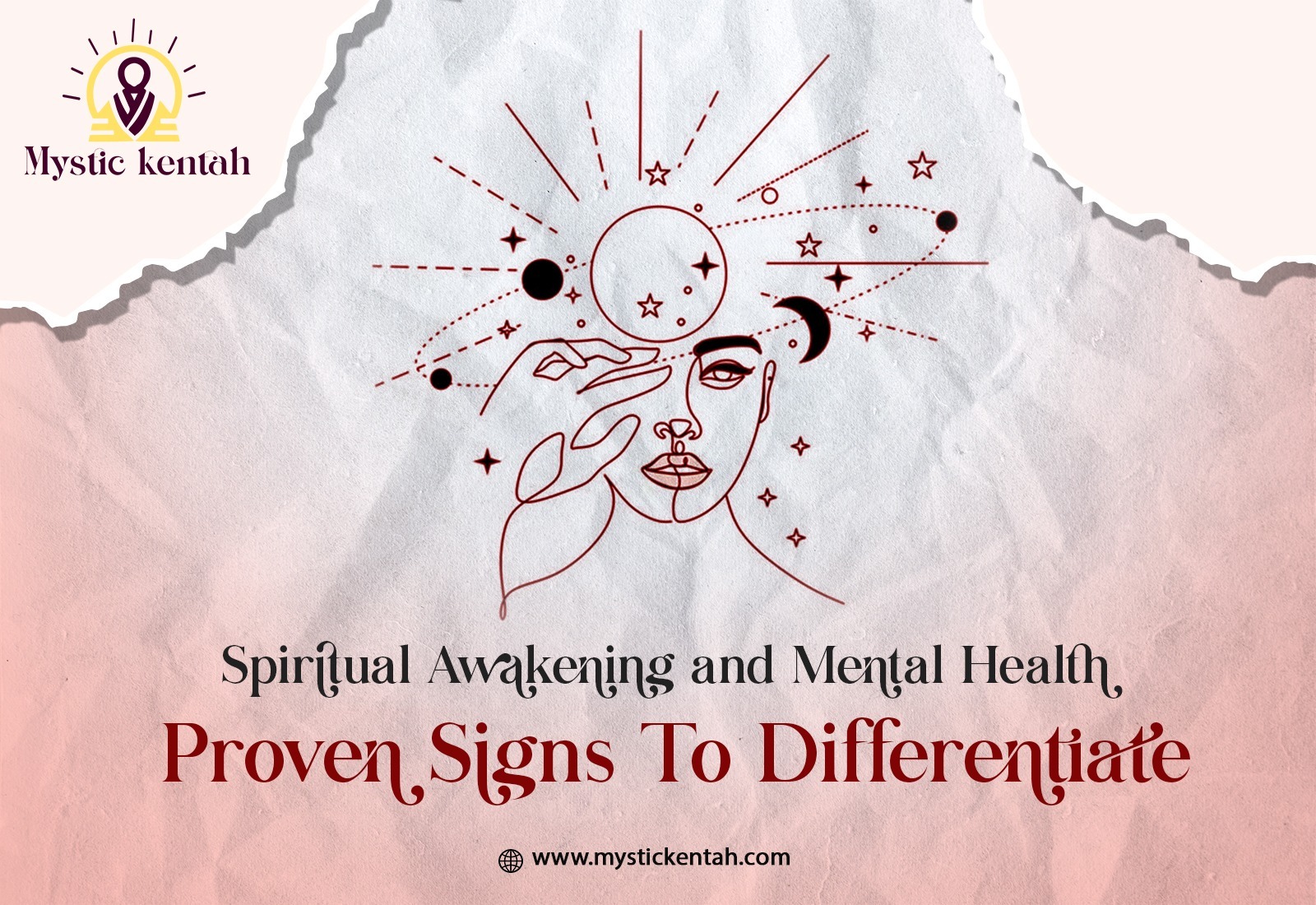Spiritual awakening is a profound transformation that shifts one’s perspective on life, leading to heightened awareness and self-discovery. However, the process can sometimes be misunderstood, especially when it presents symptoms similar to mental health conditions such as anxiety, depression, or even psychosis.
In a world where mental well-being is increasingly prioritized, it is essential to distinguish between a genuine spiritual awakening and a mental health challenge. At Mystic Kentah, we believe in guiding individuals through their spiritual journey while ensuring mental and emotional stability.
This blog will help you understand the key signs of spiritual awakening and how to differentiate them from mental health struggles.
A Few Common Triggers of Spiritual Awakening
A spiritual awakening is an internal shift where an individual starts perceiving life beyond materialistic existence. It is a journey of self-realization, enlightenment, and connection with higher consciousness. Many spiritual traditions describe this awakening as an expansion of consciousness, leading to profound inner peace, joy, and understanding.
Common Triggers of Spiritual Awakening
- Life-Changing Events – Near-death experiences, the loss of a loved one, or a personal crisis can trigger an awakening.
- Deep Meditation or Spiritual Practices – Regular yoga, meditation, or energy work can gradually lead to a spiritual shift.
- Sudden Realizations – A moment of clarity where the individual sees beyond the illusion of the ego-driven world.
- Encounters with Nature or Universal Energy – Some individuals experience awakening through deep connections with nature.
- Dark Night of the Soul – A challenging phase where old beliefs and attachments dissolve, making room for transformation.
- Reading Spiritual Texts or Learning from Mentors – Exposure to wisdom teachings or enlightened individuals can inspire a profound shift.
- Intense Emotional or Physical Pain – Suffering from deep emotional trauma, chronic illness, or physical hardships can push individuals toward spiritual transformation and a search for deeper meaning.
- Travel or Exposure to Different Cultures – Experiencing diverse spiritual traditions, ancient sacred sites, or different ways of life can spark an awakening by broadening one’s perspective.
- Sudden Life Success or Fulfillment of Desires – Achieving dreams or material success and still feeling unfulfilled can lead to questioning life’s true purpose, triggering an awakening.
- Spontaneous Awakening – Some individuals experience an unexpected and unexplained shift in consciousness, often accompanied by heightened awareness, intuition, and a deep sense of connection with the universe.
Mental Health and Its Challenges – Common Signs of Mental Health Struggles
Mental health issues involve emotional, cognitive, and behavioral disturbances that impact daily life. Anxiety, depression, schizophrenia, and bipolar disorder are some conditions that can present symptoms similar to spiritual awakening but require medical attention.
Common Signs of Mental Health Struggles
- Persistent Feelings of Sadness or Hopelessness – Chronic low mood that affects daily functioning.
- Hallucinations or Delusions – Seeing, hearing, or believing things that are not grounded in reality.
- Extreme Fear or Paranoia – Constant worry, irrational fears, or suspicion without evidence.
- Emotional Instability and Suicidal Thoughts – Sudden mood swings, emotional breakdowns, or self-harm tendencies.
- Disconnection from Reality Leading to Dysfunction – A severe detachment that makes everyday activities challenging.
- Difficulty Concentrating or Making Decisions – Struggling with focus, memory, or decision-making, which affects work, relationships, and daily responsibilities.
- Social Withdrawal and Isolation – Avoiding friends, family, or social activities due to overwhelming emotions or feelings of disconnection.
- Changes in Sleep and Appetite – Insomnia, excessive sleeping, loss of appetite, or overeating, are often linked to emotional distress.
- Physical Symptoms Without a Medical Cause – Frequent headaches, fatigue, digestive issues, or body pain that stem from emotional and psychological distress.
Mental health disorders often stem from biological, psychological, or social factors, where as spiritual awakening is a shift in perception, often leading to clarity rather than confusion.
Key Differences Between Spiritual Awakening and Mental Health Struggles
While there can be overlapping symptoms, understanding the differences can prevent misdiagnosis and unnecessary distress. Here are some key ways to differentiate:
1. Awareness vs. Confusion
Spiritual Awakening: Leads to increased self-awareness, clarity, and insight into life’s purpose. Individuals feel aligned with the universe and more at peace.
Mental Health Issues: Often lead to confusion, disorientation, and detachment from reality, making daily life challenging.
2. Emotional Balance vs. Instability
Spiritual Awakening: Though the journey may have ups and downs, it ultimately leads to emotional stability, resilience, and profound peace.
Mental Health Struggles: Result in intense mood swings, emotional breakdowns, or feelings of helplessness.
3. Connection vs. Isolation
Spiritual Awakening: Deepens the connection with oneself, nature, and the universe. The person often develops compassion and a sense of unity with others.
Mental Health Issues: This can lead to extreme isolation, withdrawal from social interactions, and feelings of being disconnected from reality.
4. Purpose and Growth vs. Stagnation
Spiritual Awakening: This brings an expanded understanding of life, encouraging personal growth and purpose-driven living.
Mental Health Issues: Often create a sense of being stuck in life, with difficulty finding motivation or meaning.
5. Spiritual Downloads vs. Psychosis
Spiritual Awakening: Some people receive sudden insights, often referred to as “spiritual downloads,” leading to heightened awareness but not disrupting daily life.
Mental Health Disorders: Hallucinations and delusions may occur, often distressing and interfering with reality perception.
6. Inner Guidance vs. External Dependence
Spiritual Awakening: Individuals rely on inner wisdom, intuition, and self-reflection for answers. They feel guided by a higher consciousness.
Mental Health Struggles: Individuals may depend on external validation, professional help, or medication to regulate their thoughts and emotions.
7. Sense of Love vs. Fear-Based Thinking
Spiritual Awakening: Brings an overwhelming sense of love, compassion, and interconnectedness. Fear is gradually replaced with trust in the process.
Mental Health Issues: Often involve excessive fear, paranoia, or anxiety, making it difficult to experience unconditional love and security.
8. Acceptance vs. Resistance
Spiritual Awakening: Encourages acceptance of oneself, others, and life’s challenges, leading to inner peace.
Mental Health Struggles: Resistance to thoughts, emotions, and circumstances can result in frustration, denial, or inner turmoil.
9. Conscious Evolution vs. Uncontrolled Chaos
Spiritual Awakening: This is a conscious process of self-discovery and evolution, leading to greater wisdom and enlightenment.
Mental Health Disorders: Can feel chaotic, uncontrollable, and overwhelming, making it hard to function effectively.
10. Energy Alignment vs. Energy Drain
Spiritual Awakening: Individuals feel a renewed sense of energy, vitality, and connection to their higher self.
Mental Health Struggles: This can leave individuals feeling drained, exhausted, and unable to maintain a stable energy level.
11. Heightened Awareness vs. Cognitive Dysfunction
Spiritual Awakening: Enhances awareness, perception, and mindfulness, leading to a deeper understanding of reality.
Mental Health Issues: Can impair cognitive functions, causing brain fog, disorganized thinking, or trouble concentrating.
12. Growth Through Pain vs. Being Overwhelmed by Pain
Spiritual Awakening: Pain is seen as a teacher, guiding personal transformation and deep healing.
Mental Health Disorders: Pain feels overwhelming and inescapable, often leading to despair or suicidal thoughts.
13. Synchronicities vs. Paranoia
Spiritual Awakening: Individuals notice meaningful coincidences (synchronicities) that affirm their journey and provide guidance.
Mental Health Issues: Individuals may develop paranoia, seeing patterns that instill fear rather than inspiration.
14. Higher Perspective vs. Distorted Reality
Spiritual Awakening: This leads to a broader understanding of life, seeing challenges as opportunities for growth.
Mental Health Struggles: Often distort reality, causing excessive worry, self-doubt, or misinterpretation of events.
15. Empowerment vs. Helplessness
Spiritual Awakening: Fosters empowerment, self-reliance, and a deeper connection with one’s inner strength.
Mental Health Struggles: Can create a feeling of helplessness, dependency, and loss of control over one’s emotions and actions.
Frequently Asked Questions
1. How can I tell the difference between a spiritual awakening and a mental health issue?
A spiritual awakening often brings clarity, inner peace, and a sense of purpose, while mental health struggles typically involve confusion, distress, and emotional instability that interfere with daily life.
2. Can spiritual awakening cause anxiety or depression?
Yes, during the initial stages of spiritual awakening, individuals may feel overwhelmed, anxious, or even experience a “night of the soul.” However, unlike mental health disorders, this phase leads to emotional balance and deeper understanding over time.
3. Are hallucinations a sign of spiritual awakening or mental illness?
In a spiritual awakening, insights or “spiritual downloads” feel uplifting and do not disrupt daily functioning. In contrast, hallucinations in mental illness are often distressing and detached from reality.
4. Can someone experience both spiritual awakening and mental health struggles?
Yes, spiritual awakening can sometimes trigger mental health challenges, especially if the person lacks guidance or struggles to integrate their experiences. Seeking support from a trusted spiritual mentor or therapist can help.
5. How do I seek help if I’m unsure about my experience?
If your experiences cause distress, confusion, or interfere with daily life, consulting a mental health professional is advisable. A spiritual guide or counselor can also provide insight into spiritual experiences.
6. Does medication hinder spiritual awakening?
Medication may stabilize mental health conditions, but it does not block spiritual growth. True awakening is about self-awareness, inner peace, and clarity, which can be achieved alongside proper medical care if needed.
The Final Wrap Up
Understanding the difference between spiritual awakening and mental health struggles is crucial for personal growth and well-being. While spiritual awakening is a profound and often positive transformation, it can sometimes be mistaken for mental distress due to its intense nature.
At Mystic Kentah, we encourage self-discovery, mindfulness, and guidance to ensure your journey is balanced and fulfilling. Whether you are awakening to a new reality or facing mental health challenges, know that you are not alone. Seek wisdom, stay grounded, and embrace the path ahead with awareness and clarity.
If you are looking for deeper insights or support on your journey, visit Mystic Kentah for personalized spiritual guidance and resources.

